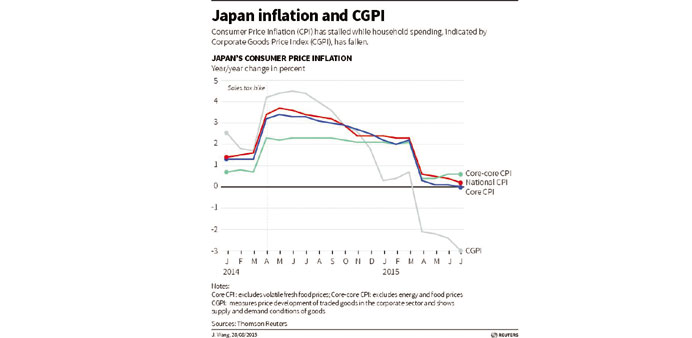AFP/Tokyo
Japanese inflation fell back to zero in July while household spending dropped again, official data showed yesterday, as a slowdown in China threatens Japan’s already precarious economic picture.
The disappointing data are sure to stoke speculation that the central bank would be forced to unleash more stimulus later this year to counter a downturn in the world’s number-three economy, which contracted in the April-June quarter.
Yesterday, government data showed core inflation, excluding volatile fresh food prices, was flat year-on-year, as lower fuel and other energy costs weighed on Tokyo’s battle to push up prices.
Household spending also fell 0.2% in July after declining 2.0% in the previous month, the ministry said.
The two monthly drops followed a strong rise of 4.8% in May that offered some hope for spending after consumers snapped their wallets shut in the wake of a sales tax hike last year.
The consumption levy rise - Japan’s first in 17 years – was aimed at taming a huge national debt but it slammed the brakes on consumer spending and pushed the economy into a brief recession.
While Japan crawled out of the red in the last quarter of 2014, the economy turned negative again with a 0.4% contraction in the second-quarter due to a slowdown in China, weak consumer spending at home and slowing exports after two consecutive quarters of growth.
Analysts have pointed to China – a major trading partner with Japan – as a red flag amid worries over the health of the world’s number two economy and a Chinese stock market bloodbath that sent global bourses into a freefall earlier this week.
Japanese exports to China represented 18.3% of total shipments last year, in value terms, just behind 18.6% to the US.
More than half of Japan’s exports are to Asia and any hit to China is bound to affect other countries in the region, according to analysts at French bank Natixis.
“If we consider how intertwined other Asian countries are with China, it is obvious that China’s economic performance is even more important to Japan than that of the US, at least as far as trade is concerned,” they said in a report this week.
“If China continues to deliver negative in terms of growth and/or financial markets, Japan cannot but be affected.”
Friday’s inflation figures are well below the Bank of Japan’s (BoJ) 2.0% target and will hike expectations that the central bank will expand its already record 80tn yen ($640bn) annual asset-buying plan in the coming months. “The 2.0% inflation target no longer stands a chance of being achieved by early next year. It seems likely that the BoJ will have to launch additional easing,” said Junichi Makino, chief economist at SMBC Nikko Securities.
Earlier this week, BoJ Governor Haruhiko Kuroda held out the possibility of more monetary easing measures.
“At this stage, we have no concrete proposal for further accommodation. But if necessary, we will certainly make (an)... adjustment,” Kuroda said in a speech delivered in New York.
The slowdown comes more than two years after Prime Minister Shinzo Abe launched a policy blitz, dubbed Abenomics, to kickstart anaemic growth and conquer years of deflation.
The programme called for big government spending, massive BoJ monetary easing and reforms to cut red tape in Japan’s highly-regulated economy - reforms that have now stalled, however.
“Japan’s economy isn’t looking good,” Yoshiki Shinke, an economist at Dai-ichi Life Research Institute, told Bloomberg News.
“Private consumption and exports are much weaker than what the Bank of Japan saw a few months ago. There’s a good chance for additional monetary easing in October.”
Despite the weak figures, Japan’s labour market remained tight with the unemployment rate inching down 0.1 point to 3.3% in July, according to separate figures also released yesterday.
A closely watched labour index was at its strongest level in 23 years at 121 job offers for every 100 people looking for work.

